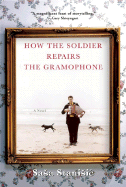

Sasa Stanisic was 14 when his family escaped from Bosnia to Germany. At 29, he wrote the novel in German. That his tale contains so much natural, laugh-out-loud comedy speaks volumes for the author, whose autobiographical hero, Aleksandar, "somewhere between eight and fourteen," is a talkative, precocious delight, determinedly optimistic in the face of heartbreaking losses, forever making startling little observations on life that somehow get it all wrong and yet sort of right. Uninhibited and outspoken, he is perpetually being sent out of the room by exasperated adults.
Stanisic's talent blazes off page after page. The opening funeral sequence is a brilliant set piece, a stand-alone 19-page wonder that is simultaneously hilarious and devastating, an unexpectedly funny tearjerker.
Once you've met the family and friends of Aleksandar, you watch the war come and destroy their world, and his family's narrow escape. But that's only the first half of the book. Midway through the novel, you come to a novel within the novel, written by Aleksandar and called, "When everything was all right." This collection of flashback vignettes offers some of the novel's most delightful writing, including a word-perfect, profoundly touching three-and-a-half-page fishing tale, and the moving story of when the town discovers that the handsome young Italian engineer designing their new dam, whom all the women adore, is gay.
The final portion of the book contains a shocking, unforgettable soccer game between Bosnians and Serbs at ceasefire. It's a tour de force of nightmarish sports writing, with bodies and hidden mines lining the playfield, old schoolmates fighting on opposing sides of the war and the game's end set to determine life or death for the captured players.
These are just a few of the novel's wonders. Stanisic is so prodigiously full of big, open-hearted wisdom, I shudder to think what he has lived through to produce, at such an early age, such a transcendent little masterwork.-–Nick DiMartino

